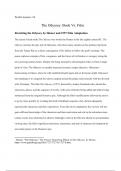World Literature 110
The Odyssey: Book Vs. Film
Revisiting the Odyssey by Homer and 1997 Film Adaptation
The classic Greek myth The Odyssey was written by Homer in the late eighth century BC. The
Odyssey narrates the epic tale of Odysseus, who faces many enemies on his perilous trip home
from the Trojan War as a direct consequence of his failure to follow the gods' warnings. The
poem explores concepts of fate, vengeance, and the forces of civilization vs savagery along the
ten-year-long journey home. Despite not being narrated in chronological order or from a single
point of view, The Odyssey is soundly structured around a single objective: Odysseus's
homecoming to Ithaca, where he will establish himself again and set his home aright. Odysseus’
last challenge is to vanquish the suitors camped around his palace and reconcile with his devoted
wife, Penelope.1 The film The Odyssey (1997), directed by Andrey Konchalovskiy altered the
characters, places, and the sequence of events, with some elements being added and others being
subtracted from the original Homeric epic. Although the film's modifications allowed the movie
to go by more quickly by avoiding the book's flashback sequence, they did not adequately
represent the characters and their experiences. From the movie adaptation, the viewers will not
gain sufficient knowledge of the characters and their motivation and role in the adventure since
certain events were shortened or altered. Although events in the film are altered to accommodate
viewing time, the film's significant omissions, alterations, and lack of character development do
not render justice to the Homeric epic.
1
Homer. “The Odyssey.” The Project Gutenberg EBook of The Odyssey, by Homer,
https://www.gutenberg.org/files/1727/1727-h/1727-h.htm.
, Remapping and Refiguring: Poem to Film Adaptation
The order in which events take place is the first significant distinction between the poem
and its adaptation picture. Homer asks the goddess Athena to tell him the story of Odysseus in
the poem's prologue, which is written from Homer's point of view. While Prince Telemachus is
born at the beginning of the film. Furthermore, after the poem's prologue, book one narrates a
discussion between the gods of Olympus about Odysseus' fate when he is imprisoned on the
island of Ogygia: the sea nymph goddess Calypso's island, Athena is in support of Odysseus'
liberation.2 But in the film, the focus shifts from Telemachus' birth to Odysseus' involvement in
the Trojan War.3 This distinction serves the objective of attracting viewers, as Andrei
Konchalovsky reworked the film to include scenes of Odysseus leaving his home and the Trojan
War; otherwise, the audience would be perplexed about later events. In this case, the film
adaptation allows The Odyssey to be about Odysseus rather than some secondary characters.
There is a significant difference between the film adaptation and the poem regarding the
relationship between Poseidon and Odysseus. In Homer’s epic, Poseidon is infuriated with
Odysseus who blinded his son, the cyclops Polyphemus. Furthermore, in the poem, Odysseus
blinds Polyphemus with a rod. In the film, Odysseus and his men pierce his eye with a wooden
stake. However, according to the film, Poseidon aided Odysseus in the Trojan War with the
Trojan Horse by having his sea monsters kill Laocoon, who warned the Trojans about the horse.
It was when the Trojans accepted the horse as a sacred offering that the Greeks won the war.
Odysseus claims the victory as his own, thereby infuriating Poseidon and making Odysseus'
2
Homer. “The Odyssey.” The Project Gutenberg EBook of The Odyssey, by Homer,
https://www.gutenberg.org/files/1727/1727-h/1727-h.htm.
3
Homer, et al. “The Odyssey.” Amazon, Viking, 1996,
https://www.amazon.com/The-Odyssey/dp/B07BC9H2T5.




